Not everyone would assume that there’s an enduring need for CRMs for small businesses. In fact, there’s a common misconception that CRMs are only used by large corporations or rapidly growing startups; but this simply isn’t true!
Small business owners and employees wear many hats and are looking for solutions that will enable them to tackle several different challenges in order to help them grow.
For a small business, a CRM is a tool that helps cut out the clutter and build strong relationships with clients. In this blog, we’ll cover exactly what a CRM tool entails and what it can do for you and your team. Along the way, we’ll give you an insider’s look at monday sales CRM and how it can be the perfect solution for your small business (Spoiler alert: there’s even a free forever plan!).
What is a CRM for small business?
CRM stands for customer relationship management. It’s essentially software that stores and organizes data about your customers in a centralized location, allowing you to keep track of individual customers.
With a CRM platform, you can view all previous interactions and get up to speed before reaching out to a customer, enabling you to deliver a better customer experience by making each interaction intentional and personal.
Is a CRM useful for small businesses?
In short: yes.
Considering that 76% of customers would stop doing business with a company due to one bad experience, providing stellar client service remains a top priority for businesses of all sizes. A CRM system can make or break how a small business performs in this arena.
That said, while a CRM can make your business more efficient, it needs to be used correctly. Some businesses might focus too narrowly on lead management and generation or sales and overlook how a CRM for small businesses is multi-faceted and functions as a central source for client data and interactions.
CRMs make it easier for businesses to track data and personalize the entire customer experience, improving sales, revenue, and customer loyalty along the way.
The ideal CRM software should do more than just track sales. It should connect your marketing and customer service teams with the sales team to provide a holistic view of the customer’s entire experience. monday sales CRM gives you the flexibility to build your own sales pipeline management software that works seamlessly with third-party integrations to help you manage it all.
Top 5 best CRMs for small businesses
With so many different CRMs out there, it can be difficult to know which is the best CRM for a small business. Let’s break down the top 5 best CRMs for small businesses in a little more detail.
monday sales CRM
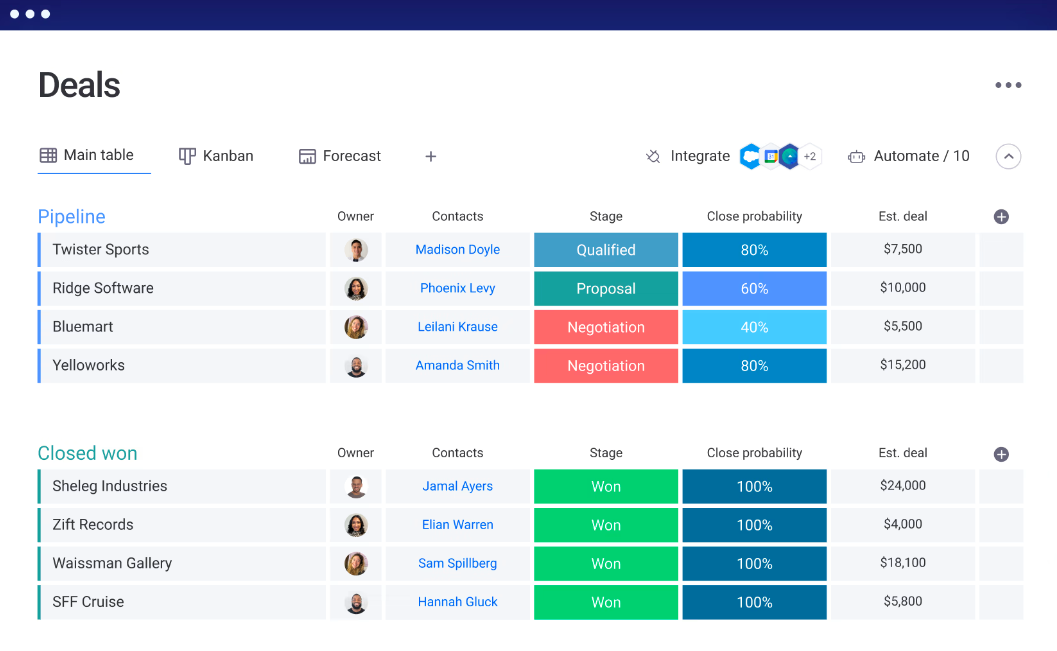
Price: starting from $0-24 per user
monday sales CRM provides its users with user-friendly interfaces and an unlimited number of boards to organize projects and track customers. You can communicate with customers, visualize and analyze customer data, and use dashboards and templates to simplify operations. monday sales CRM offers loads of scalability, enabling small businesses to run and manage any workflow.
Pros:
- Free forever plan
- Highly customizable to your needs
- Templates make it quick and easy to get started
- Build your own automations
- Easy to use with virtually no learning curve involved
Cons:
- Certain features only available on higher plans
- You’ll also need to upgrade your plan for a higher automation/ integration limit
Pipedrive
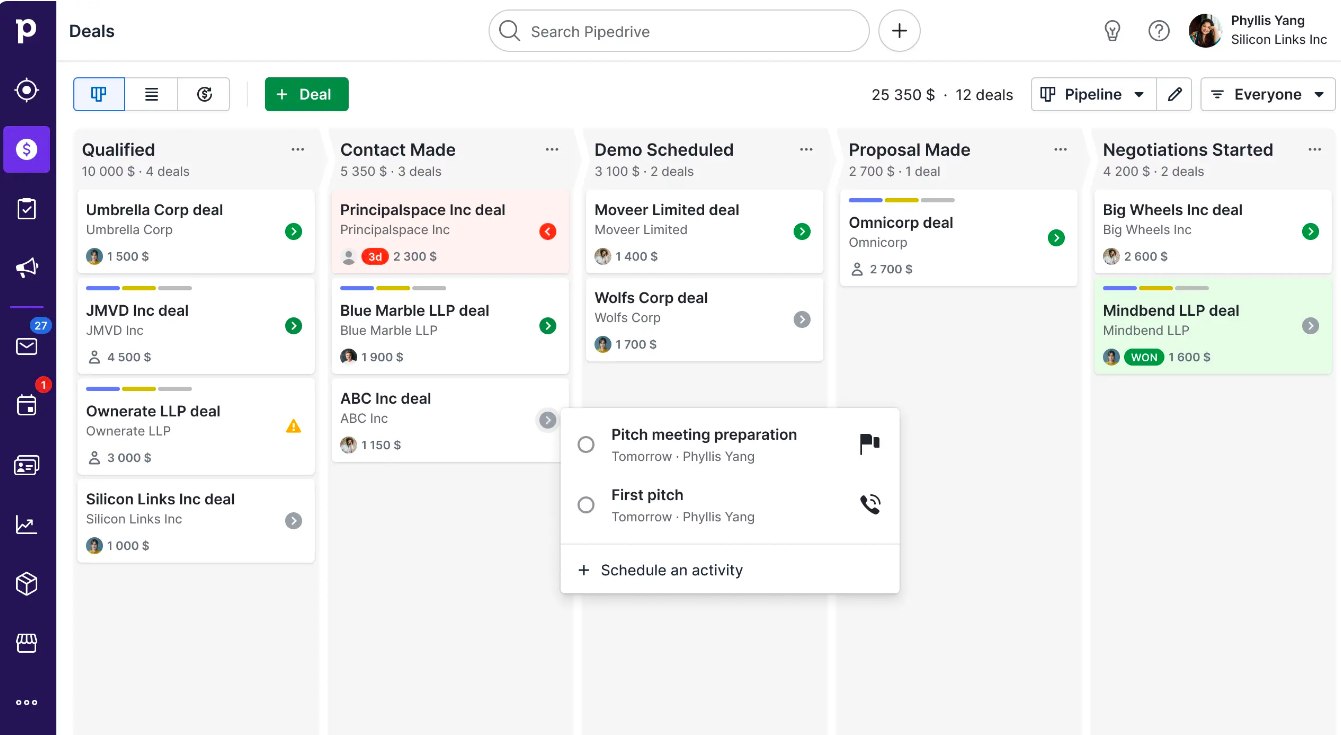
Price: from $14-99 per user
Pipedrive is a CRM solution for small businesses that want to focus on a strong visual sales pipeline. It features drag-and-drop functionality to quickly respond to essential tasks, as well as customizable pipelines and fields to streamline existing systems and optimize processes. Plus, its mobile app allows for convenient engagement with customers and team members from anywhere.
Pros:
- Helpful mobile CRM apps
- 24/7 email and chat support
- Simple, visual user interface
Cons:
- Lacks an internal emailing platform
- Functionality is limited for the price
- No free plan
Salesforce
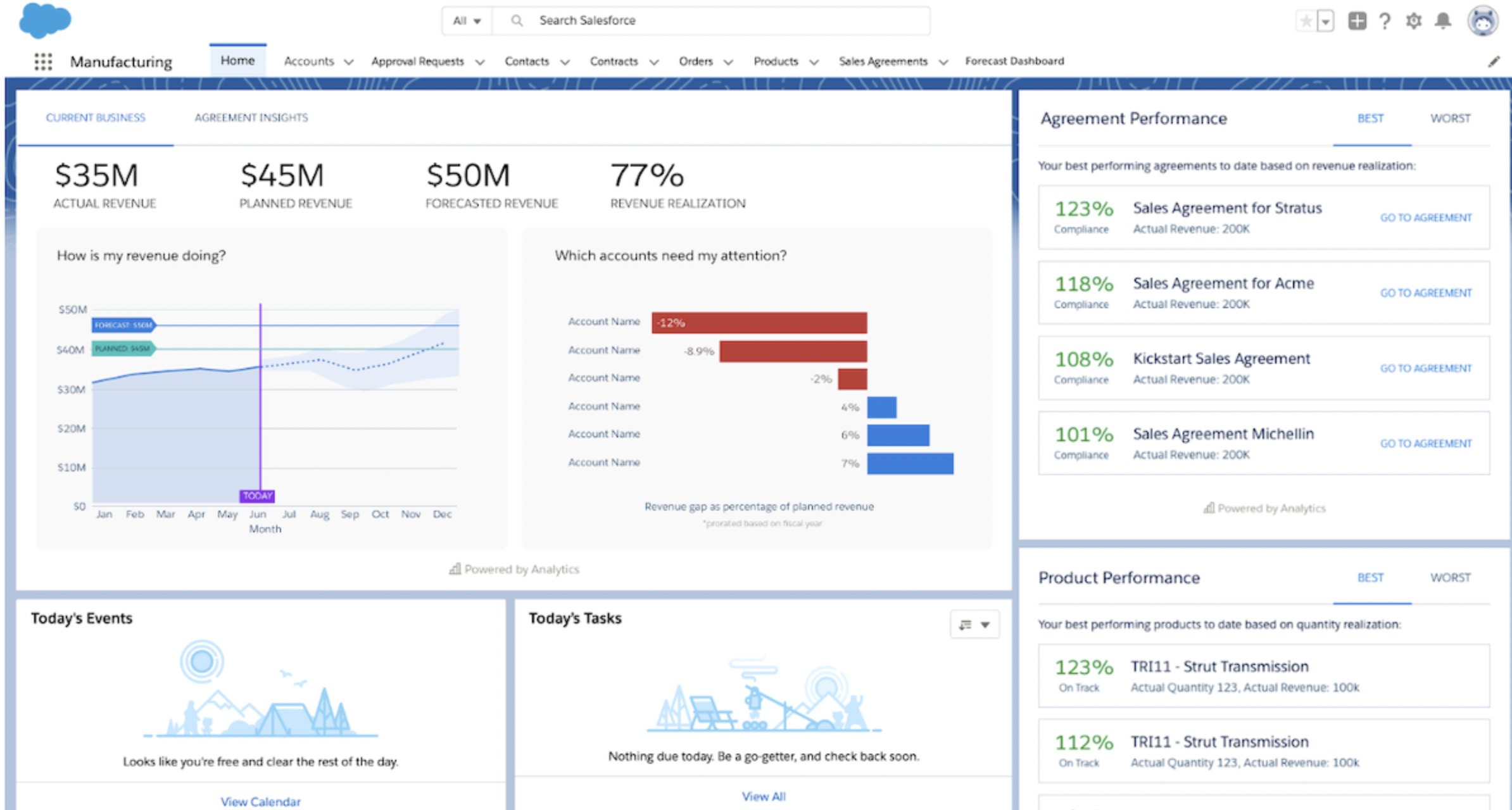
Price: $25 per user
Salesforce is a household name in the CRM industry. It provides a cost-effective platform for businesses of any size. For those wanting more advanced CRM options, Salesforce offers a wide variety of solutions designed specifically for sales, marketing, and customer service teams.
Pros:
- Gives you access to Salesforce tech stack
- Great mobile apps to stay connected on the go
- Cloud-based platform available anywhere
Cons:
- High starting price without a free plan
- Steeper learning curve than other CRMs
- Setup and implementation can be time-consuming
Zoho CRM
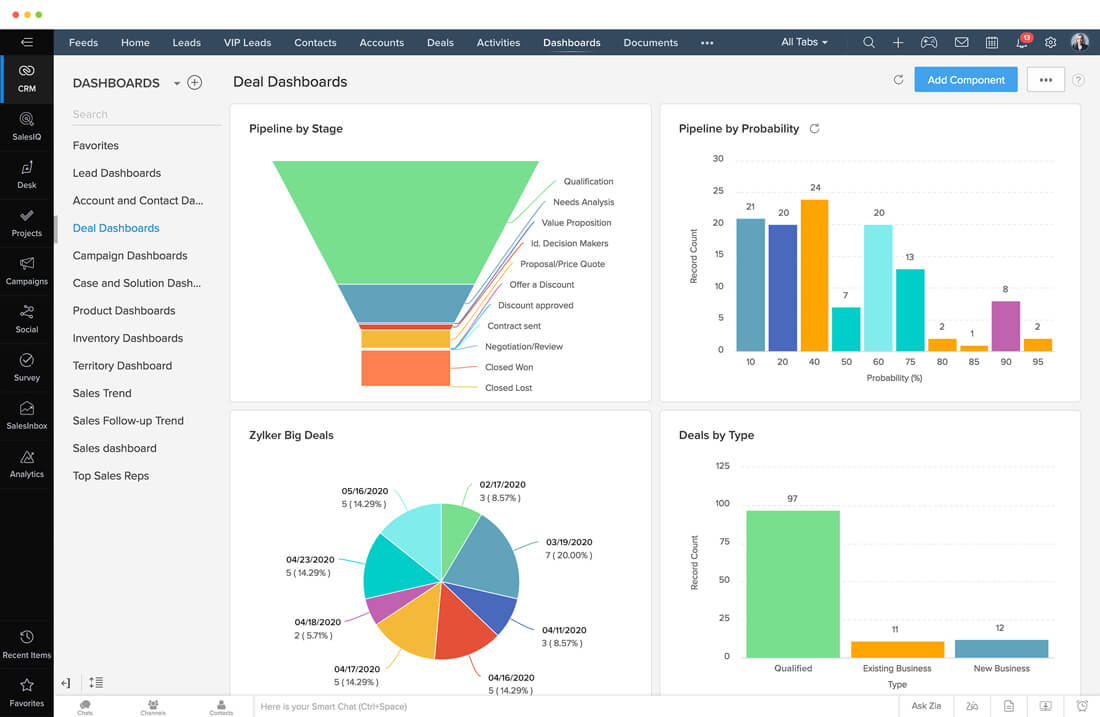
Price: From $12-45 per user
Zoho enables users to increase leads, accelerate sales, and accurately measure performance in its CRM platform. The built-in AI-powered assistant, Zia, assists in predicting leads and deals, spotting potential customers for conversion, as well as guiding large sales teams in their efforts. Zoho also provides an attractive option for remote workforces due to its “trophy” features that foster a competitive yet friendly sales atmosphere.
Pros:
- Free plan available
- Conduct meetings and presentations from within the CRM
- Set alerts for remote workers
Cons:
- AI-powered assistant only available on the more expensive Enterprise plan
- Customer support outside of business hours costs extra
- Certain features restricted to daily limits
Freshsales
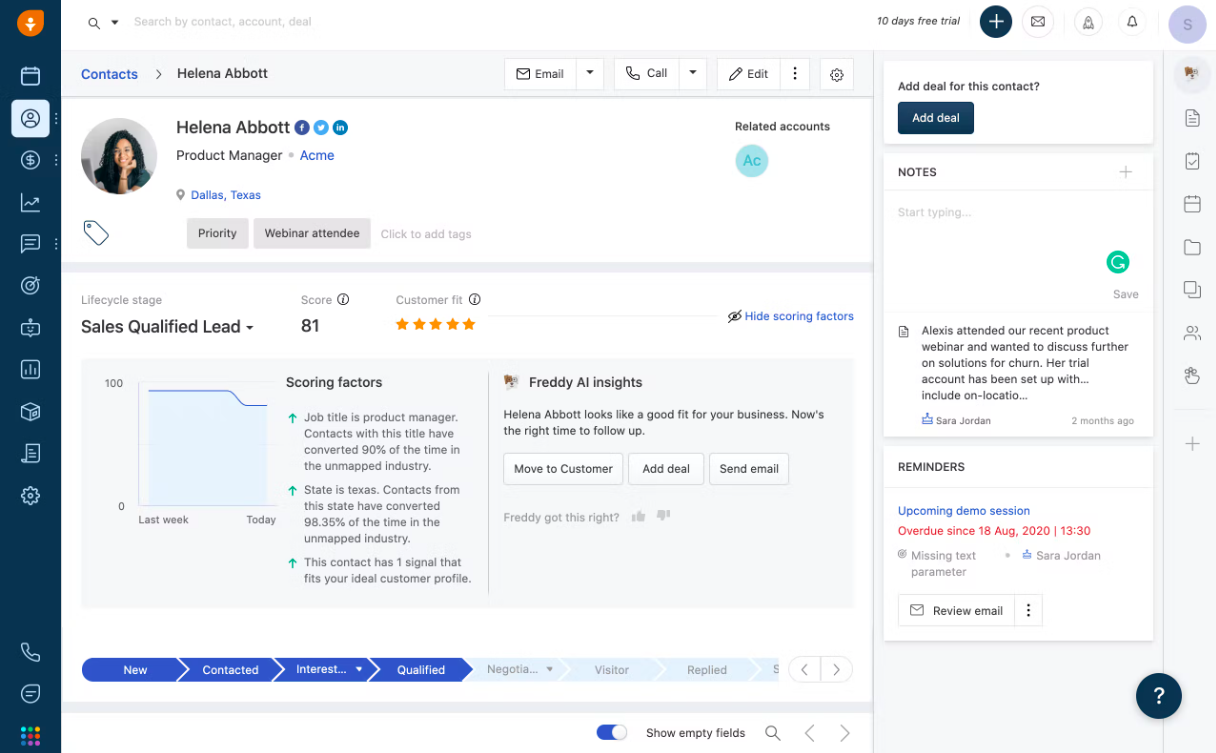
Price: from $15-69 per user
Freshsales CRM software offers a variety of tools to enhance customer communication. It also has an AI assistant, Freddy, to help businesses gain insights into their customer base by analyzing historical sales data, activities, and engagement. Additionally, Freshworks includes a built-in VoIP phone service with toll-free local numbers available for purchase in over 90 countries, allowing for calling from any device.
Pros:
- Basic built-in VoIP phone service
- Long 21-day free trial available
- Free forever plan
Cons:
- A lot of features reserved for more expensive plans
- File storage limits
- Built-in VoIP lacks cloud-based call management tools
What are the benefits of a CRM for small businesses?
With such varied goals, it’s important not to slow down your employees with unnecessary and disjointed tools.
When you build a custom CRM solution with monday sales CRM, you can bring all of your tools into a single interface. Your employees only need to use one tool to provide the best possible experience for your customers.
Here are some other key benefits that a good CRM offers:
- One source of truth for your entire company: Workers routinely waste time searching for information across different tools, leading to discrepancies or inaccuracies and poorer business outcomes. With a CRM, everything you need lives on a single platform.
- Better data and reporting: A CRM aggregates all your sales and customer data into an easily accessible dashboard. With a customizable CRM, you can configure sales dashboards to pull customer data from any board that’s part of your system, from lead and contact management to the sales pipeline and beyond, providing your team with instant performance insights.
- Increased efficiency and productivity: With centralized, accurate data, your team can get more done in less time. They can also make use of workflow automation features to boost efficiency and productivity.
- Lower business expenses: This one’s a no-brainer. When your team can work more efficiently, business expenses decrease. You’ll close deals faster, generate more revenue, and create breathing room to let your business grow.
- Better customer experience: When your sales, marketing, and customer service teams are more engaged, efficient, and productive, customers get a better experience with your team, leading to increased customer loyalty.
4 must-have features of a small business CRM
Before we get into four of our favorite small business CRM features, all of which can be found in monday sales CRM, let’s cover some of the baseline features. Here’s a checklist of typical requirements you should look for:
- Contact management
- Sales automation
- Lead management
- Business intelligence and reporting
- Centralized internal and external communication
Now let’s take a look at four key features of monday sales CRM that can help you gain all the advantages your small business needs.
1. Tool integrations
To create a centralized hub, you’ll need to bring all of your other tools into the CRM platform. CRM integrations compile everything in a single application, saving you time from switching back and forth between windows.
With monday sales CRM, you can even set up workflow automation and marketing automation sequences between the CRM and your external tools, like this CRM Gmail integration.
Some of the external tools you’ll be able to connect to your monday sales CRM include:
- Communication tools like Slack, Outlook, and Microsoft Teams
- Sales tools like Salesforce, Shopify, and Pipedrive
- Marketing and social media tools like MailChimp, Hubspot, and Facebook Ads
- Project management tools like Asana, Trello, and Toggl
- File-sharing tools like Dropbox, Google Drive, and Box.com
You’ll also find integrations for creative design processes, software development, and more. Depending on your needs, you can use these integrations to conduct your work from a single application or use them to import historical data from your old CRM or sales management software.
2. Workflow automation
Workflow automation is at the heart of an effective CRM for small businesses.
By setting up automations for tedious manual tasks, your team is freed up to focus on revenue-driving activities. They can spend more time serving customers and less time hunting down information, following up with coworkers, or on other common time-wasters.
Here are some examples of workflow automation that can benefit sales, marketing, or customer support teams:
- Notify a sales rep when the company receives a new lead
- Set up recurring task reminders for ongoing activities
- Create follow-up reminders after a certain time period has passed
- Send a welcome email to a new prospect
- Update an item status on a certain date
- Create automated outreach sequences for each prospect and customer (For example, using Spotio’s AutoPlays)
You can connect these automations to your tool integrations. For instance, you can send notifications or follow-ups through Slack or Gmail.
3. Personalized communication
A good CRM tool goes beyond simple lead management. It should foster personalized communication between your business and your customers at every possible opportunity.
Strong contact management tracks everything about a customer’s interactions with your business over time. This should include their name and contact information, their preferred method of contact, and their last company interaction.
When you track your customer relationship closely, it makes it easy to provide a seamless experience for every customer. Any team member, whether they’re in sales, marketing, or customer service, can pick up exactly where a previous employee left off, even if they’ve never spoken to that customer before.
4. Pipeline management
You need a platform that helps you easily visualize your sales process so you can spot exactly where a prospect is in their buyer’s journey, when they got there, and how long they’ve spent there.
Once you have this information, you can use it to track customers, automate notifications to sales reps, and tailor your communication for follow-up or customer support.
Qualities to look out for when choosing a CRM for your small business
Certain qualities are non-negotiables when choosing a tool that will grow your small business. We created monday sales CRM software so that you can enjoy all the must-have CRM features with a product that checks off all the following functionalities:
- Fully customizable: Your CRM should match your business processes, not the other way around. A good CRM solution will let you manage sales activity, marketing campaigns, and any other facet of your customer experience in a way that makes sense for your business. monday sales CRM can be easily tailored to your requirements without any technical know-how. Edit deal stages, add as many columns as you’d like, manage multiple pipelines at once, and more.
- Easy-to-learn: No one wants to spend weeks learning a new tool. The right CRM will have a shallow learning curve to help employees get up to speed as quickly as possible.
- Flexible and adaptable: Whether you need to manage more leads and sales or update your entire pipeline, your CRM should seamlessly adapt to your business. For instance, as you develop your sales funnel, you may find a need for tracking sales documents. In monday sales CRM, you can easily build a document tracker like the one below and immediately integrate it into your CRM system. You can also create your own documents that incorporate live dashboards, boards, and more with monday workdocs.
- Collaborative: A good CRM empowers your employees to work well together by providing simple methods of communication between teams, helping them provide the best customer experience. It should also play nicely with your external tools, so you can keep everything in one place.
- Cloud-based: A cloud-based CRM gives you the freedom to access your data from anywhere while also making sure you never run out of storage as you add more leads and customers to your database.
monday sales CRM: a simple CRM for small business needs
monday sales CRM empowers any business to use the precise tools they need to work effectively. Not every small business will require the same features, so turning to a fully customizable CRM like monday sales CRM makes it easy to get the functionality you need without sacrificing usability.
Still, we think some of the core monday sales CRM tools can be helpful for small businesses in any industry. Here’s a closer look at some of the features you’ll definitely want to include in your customizable setup.
Centralized communication
With monday sales CRM, all teams can communicate with your clients in one comprehensive platform. So whether your service team is helping with a customer inquiry or your sales team is following up on a lead, you can easily keep track of interactions and offer personalized service all from one place.
Get insights with customizable dashboards
What goes on your dashboard is up to you, but every small business needs one way to get a cohesive overview of its performance. With monday sales CRM customizable dashboards, you can gain visibility into your projected revenue, real-time deal updates, and see how your team’s performance stacks up against company goals.
Advanced data organization
monday sales CRM allows you to merge and integrate your existing data from external sources, such as from Excel sheet or an API. monday sales CRM can help you eliminate duplicate data and automatically enter data gathered from lead capturing, cutting down on the time you spend sorting through multiple sheets and apps.
Harness the power of automations
Speaking of saving time, with monday sales CRM, small businesses can create their own custom automation to cut down on time and put manual tasks on auto pilot. You can trigger a desired action when a new email is opened or received, when a lead moves through the pipeline, or set reminders based on your timeline and milestones.
FAQs about CRM for small business
How to choose a CRM for small business?
In order to choose the best CRM for your small business, you need to first determine your needs, look at your budget, research different solutions, consider which integrations you’d need, and then finally test out different systems using free plans or free trials.
How much is a CRM for small business?
Prices for a CRM for small businesses range widely depending on the CRM you choose and the features you need. Some CRMs offer a free forever plan, while others only have a free trial. In general, you can expect costs to fall between $10-100 per user.
Is a CRM useful for small businesses?
Yes. A CRM can enable small businesses to track customer interactions, manage customer data, and use improve marketing and sales strategies. Additionally, a CRM can help streamline processes, improve customer service, and develop better relationships with customers.
Build the right CRM for your small business with monday sales CRM
The right CRM software can have a powerful impact on your small business. You’ll minimize business expenses while increasing sales and revenue, and best of all, both your customers and employees will be happier and more engaged.
You can build a custom solution using monday sales CRM platform to perfectly meet the needs of your business and your customers. With tool integrations, workflow automation, and personalized communication available in a single interface, your CRM can adapt to match your sales process in its entirety.
Start creating a simple CRM for your small business faster with our free trial, no credit card required, or check out our CRM pricing page.
Explore other B2B CRMs: CRM for publishers, CRM for lawyers, CRM for SaaS, CRM for startups, CRM for recruiting

